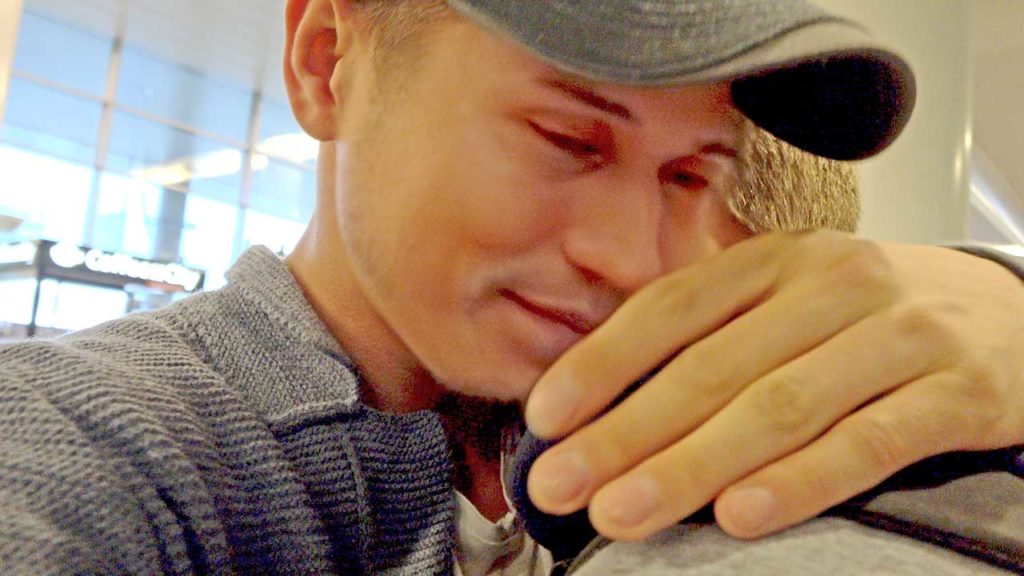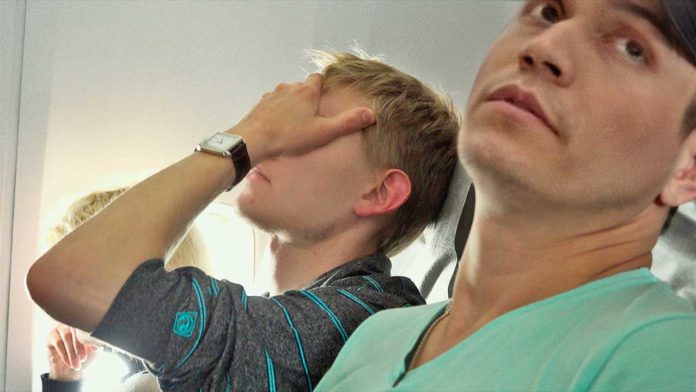One of the most powerful moments in the documentary, “Welcome to Chechnya,” premiering June 30 at 10:00 pm on HBO, has a young gay man recalling his arrest and torture. When he went to visit a guy he met online, policemen hiding in the bathroom arrested and detained him. They tortured him in hopes of getting the names of other gay men. He was subjected to electric shocks and batons, and his nose was broken. He claims it could have been worse. (He describes worse; it involves a rat on a man’s back trapped under a pot that is heated).
The report is just one of many disturbing moments in out gay director David France’s devastating film that shines a critical light on the antigay purges in Ramzan Kadyrov’s Chechnya. But this film also chronicles the courageous efforts of activists David Isteev and Olga Baranova, who help members of the LGBTQ+ community by finding them safe houses and arranging their escape.
A note in the film’s opening moments explains that all of the subjects in the film have had their faces digitally disguised to protect them. And a pre-title sequence has a young woman, “Anya” calling David seeking safety. Anya explains that her uncle found out about her sexuality, and he will tell her father — a high ranking Chechen official — unless Anya has sex with him. She wants to flee.
Anya’s story is picked up later in the documentary, when France explains how difficult it is for lesbians to be safe. Many women are battered at home. Because they cannot travel alone, there is greater risk in getting them out of the country. The extraction of Anya plays like a thriller, complete with secret meetings, distractions, and even checkpoint passport drama.
Other stories in “Welcome to Chechnya” are equally compelling, such as a segment dedicated to Zelim Bakaev, a popular Chechen singer who is believed to have been disappeared, tortured, and killed because he was gay.

But the film’s most significant story chronicles “Grisha,” a 30-year-old Russian man who was working in Chechnya when he was arrested for being gay. He is being protected by the Russian LGBT Network, and soon reunites with his boyfriend, “Bogdan.” Their affection, especially when they meet at the airport, is palpable. But their story is complicated. Since Grisha was released from detention (where he was tortured), his family is not safe; they all must evacuate. Moreover, Grisha bravely agrees to file a criminal complaint and speak publicly about his torture. During his emotional press conference in Moscow, Grisha discloses his real identity — Maxim Lapunov — and France reveals his real face. Lapunov becomes both a symbol and a target for speaking out against the antigay campaign.
France does an excellent job capturing the fear the LGBTQ+ Chechens face during this crackdown. The mood in the safe house where these men and women live ranges from supportive to intense. Grisha, Bogdan, and Akhmad — another gay man featured in the film seek asylum — each experience fears and doubts about adjusting to a “new life” that fray their already worn nerves. In contrast, Anya is playing a waiting game and is kept under lockdown until a host country is found. She struggles with being isolated, even as she is told leaving the apartment just to take out the trash could end her life.
“Welcome to Chechnya” also gives voice to the heroic efforts of folks like David Isteev and Olga Baranova. Isteev sits for a series of interviews where he explains the background of the purges and Kadyrov’s relationship with Putin. He also touches on the financial and logistical help the Russian LGBT Network faces. He is obviously weary as the toll his work takes is visible, but his hope, support, and patience is also evident.
Likewise, Olga’s efforts to assist members of the LGBTQ+ community are laudable. Her story, however, develops an interesting wrinkle that is best left for viewers to discover.
“Welcome to Chechnya” is not an easy film to watch. Periodically, France includes video intercepts that depict gay men being beaten, tortured, and even raped. There are upsetting images, shown on cell phones, of gay mens’ bruises and scars received from electric shocks. But these scenes, like the personal stories recounted by the protected subjects, are necessary to illuminate the human rights violations of LGBTQ+ people in Chechnya. Such evidence helps hold the men who order and execute the torture and killing accountable. As one subject in the film says, “It could be your son or daughter next.” And if these crimes are allowed to happen, says another subject, what will happen next?
These are the chilling thoughts that viewers are left with at the end of “Welcome to Chechnya.”
